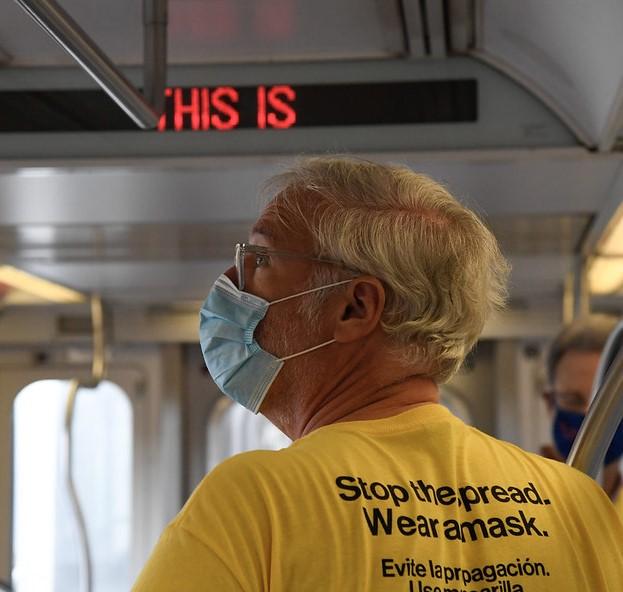July continues to look like April for the United States, with the death toll for the novel coronavirus reaching more than 1,000 fatalities for the second day in a row as cases continue to surge across much of the South and Western parts of the country.
According to the COVID-19 tracker maintained by Johns Hopkins University, there were 71,695 new cases and 1,195 deaths recorded yesterday, raising the national total to 4,007,859 cases and 143,846 deaths today.
The nation first reached 1 million cases at the end of April, but saw 3 million cases on Jul 7, just 16 days ago.
Hospitalization rates continue to follow the increasing case counts. According to the New York Times, rates are now approaching the same numbers seen in mid-April, when New York City was the epicenter of the outbreak. Texas and Florida account for many of the hospitalizations, and to a lesser extent, Las Vegas, Nashville, and Tulsa.
The analysis shows that at the peak of the New York City outbreak, on Apr 11, there were 144 hospitalizations per 100,000 people. Currently in the Rio Grande Valley in Texas there are 109 hospitalizations per 100,000.
Yesterday, White House coronavirus task force leader Deborah Birx, MD, warned several state and city leaders that Baltimore, Cleveland, Columbus, Indianapolis, Minneapolis, Las Vegas, Miami, Nashville, New Orleans, Pittsburgh, and St. Louis were seeing notable increases in percent positive test results, according to an exclusive report from The Center of Public Integrity. Birx relayed this information on a phone call, and urged city leaders to take aggressive actions against current outbreaks.
"What started out very much as a southern and western epidemic is starting to move up the East Coast into Tennessee, Arkansas, up into Missouri, up across Colorado, and obviously we're talking about increases now in Baltimore," Birx said, according to a transcript of the call obtained by the Center. "So this is really critical that everybody is following this and making sure they're being aggressive about mitigation efforts."
Poll: 60% of parents say wait to open schools
With only weeks until school is supposed to start across most of the country, a new poll from the Kaiser Family Foundation shows 60% of American parents said it's better to open schools later to minimize risk, while 34% said it's better to open schools sooner so parents can work and kids can get services. More than two-thirds (71%) said schools in their area need more resources to open safely.
Parents of color were more likely than white parents to say it is better for schools to open later, and to say that their own child's school lacks the resources it needs to reopen safely.
Despite their hesitancy, most US parents are very worried about school not reopening in the fall. Sixty-seven percent said they worry about their children falling behind socially and emotionally if school doesn't reopen, and 65% worry about falling behind academically. About half worry about losing income if they can’t go to work (51%) or not being able to pay enough attention to their kids if they're working at home (47%).
Eleven of the 15 largest school districts in the country have announced plans to start the 2020-2021 school year either online or with a hybrid of online and distance learning in the face of rising case counts, according to USA Today. Two of the nation’s biggest districts, Atlanta and Dallas, said they are pushing back reopening plans until later in September.
Eleven of the 15 largest U.S. school systems are in communities seeing infections at more than three times the rate they were in the 2 weeks ending May 1, the newspaper said. And all districts are in worse shape than when they closed in March.
NIH goal: 6 million tests a day
Today in the New England Journal of Medicine, the National Institutes of Health (NIH) announced the new Rapid Acceleration of Diagnostics (RADx) initiative, with the goal of testing 6 million Americans each day for the virus with a low-cost, point-of-care, rapid diagnostic test.
RADx will operate with a "innovation funnel" design, where applications quickly move through multiple stages of review with increasing scrutiny, meaning about 15 to 20% of RADx Tech applications will qualify for additional consideration and review, the NIH said in a press release.
The project is funded with $1.5 billion appropriated by Congress on Apr 24. The NIH said they plan to reach their 6 million tests per day goal by December of this year.
Baseball, jobs, testing
- Major League Baseball starts an abbreviated 60-game season today, with a socially distanced game between the Washington Nationals and the New York Yankees. Players will play to empty stadiums and be masked. Anthony Fauci, MD, director of the National Institute of Allergy and Infectious Diseases, is set to throw out the first pitch tonight.
- For the first time in 4 months, the number of Americans filing for unemployment rose again last week, a sign that labor market is stalling due to the rise of COVID-19 cases. According to the latest jobless claims report from the Labor Department, 32 million Americans were collecting unemployment as of early July. Jobless claims last week were 1.416 million.
- Nursing home staffers will receive weekly COVID-19 tests, according to a new federal rule that will be overseen by the Centers for Medicare and Medicaid Services. COVID-19 has killed at least 57,000 residents of long-term care facilities in the US since February.




















